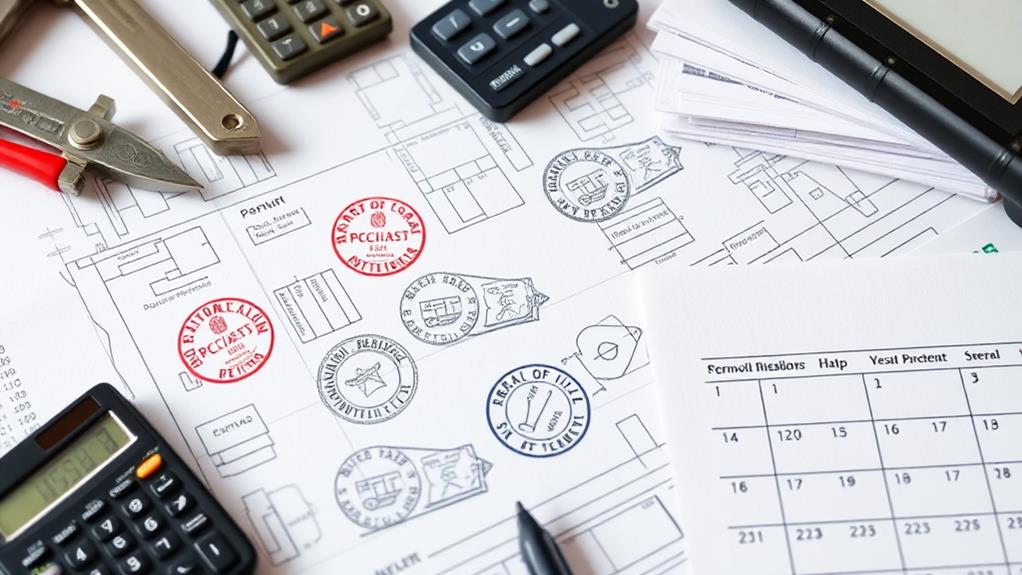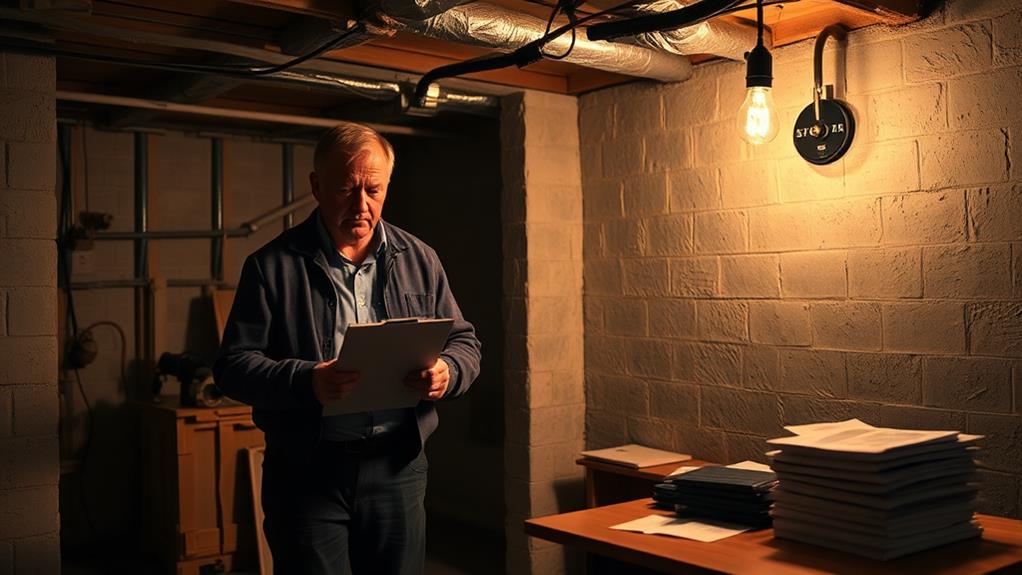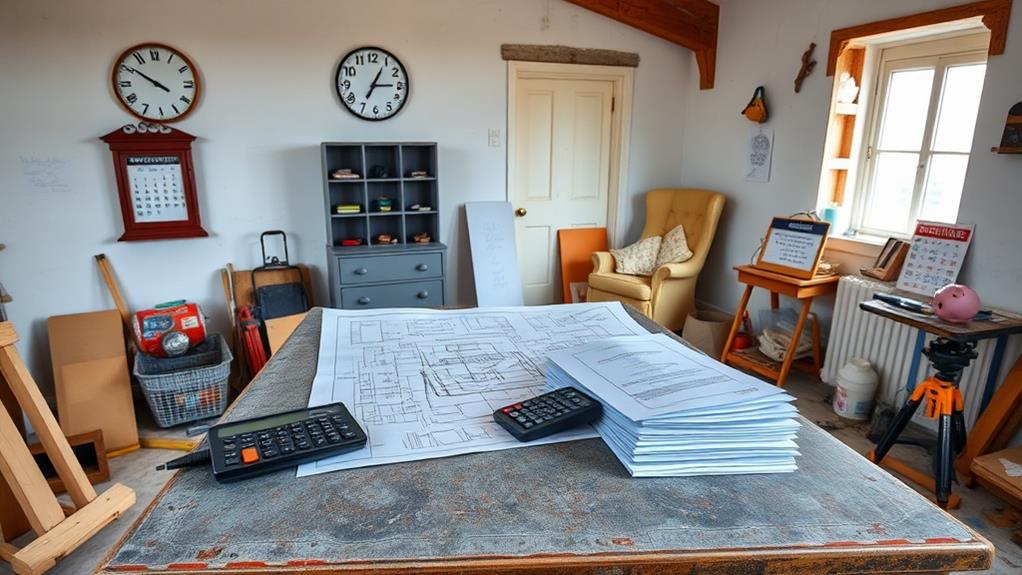Renovation permits significantly impact both budget and timeline for home improvement projects. They range from $100 to over $1,000, depending on project scope, and can take anywhere from a few days to 6 weeks for approval. This waiting period delays the start of work and affects scheduling. Skipping permits can result in fines, insurance issues, and decreased property value. Proper budgeting should account for permit fees, potential expediting costs, and contingencies for delays. Early application, accurate documentation, and communication with the permitting office are crucial for smooth project execution. Understanding the permit process can lead to better project planning and outcomes.
Types of Renovation Permits

Homeowners embarking on renovation projects must navigate a complex landscape of permits. These permits vary depending on the scope and nature of the work being undertaken.
Common types include building permits, which are required for structural changes, additions, or major alterations to a property. Electrical permits are necessary for any work involving wiring or electrical systems, while plumbing permits cover installations or modifications to water supply and drainage systems.
HVAC permits are required for installing or replacing heating, ventilation, and air conditioning systems. Demolition permits are essential when removing structures or parts of a building. Zoning permits ensure that renovations comply with local land use regulations and building codes. Some areas may require special permits for projects affecting historic properties or environmentally sensitive zones.
For smaller projects, homeowners may need to obtain specific permits such as window replacement, roofing, or fence installation permits. It's crucial to research local regulations, as permit requirements can vary significantly between municipalities. Failing to obtain the necessary permits can result in fines, work stoppages, and complications when selling the property.
Cost of Permit Applications
When undertaking a renovation project, one must consider the cost of permit applications as part of the overall budget. These costs can vary significantly depending on the scope of work, location, and local regulations. Typically, permit fees are calculated based on the estimated value of the renovation project or the square footage involved.
For minor renovations, such as updating a bathroom or kitchen, permit costs may range from $100 to $500. More extensive projects, like home additions or structural changes, can incur fees of $1,000 or more. Some municipalities charge a flat rate for certain types of permits, while others use a sliding scale based on project value.
Additional fees may apply for specialized inspections, such as electrical or plumbing work. It's important to note that some jurisdictions require multiple permits for a single renovation project, potentially increasing overall costs. Homeowners should also budget for potential re-inspection fees if initial inspections fail.
To accurately estimate permit costs, contact your local building department or consult with a licensed contractor familiar with local regulations. Factor these expenses into your renovation budget to avoid unexpected financial strain during the project.
Typical Permit Approval Timelines

Beyond the financial considerations of permit applications, understanding the typical approval timelines is key for effective project planning. Permit approval times can vary significantly depending on the scope of the project, local regulations, and the efficiency of the issuing authority.
For minor renovations, such as interior remodeling or small structural changes, approval may take anywhere from a few days to two weeks. More complex projects, like home additions or major structural alterations, typically require longer review periods, often ranging from three to six weeks.
Some jurisdictions offer expedited services for an additional fee, which can reduce wait times by up to 50%. However, incomplete applications or those requiring revisions can extend the process considerably. It's crucial to submit thorough, accurately prepared documentation to avoid delays.
Certain projects may also require zoning variances or historical preservation reviews, which can add weeks or even months to the timeline. Homeowners should factor these potential delays into their project schedules and consult with local authorities early in the planning process to anticipate any special requirements or potential bottlenecks in the approval process.
Impact on Project Schedule
Navigating the permit process significantly influences a renovation project's timeline. The impact can range from minor delays to substantial setbacks, depending on the complexity of the project and the efficiency of the local permitting authority. Typically, homeowners and contractors should factor in an additional 2-8 weeks for permit approval when planning their renovation schedule.
During this period, no work can legally commence on the aspects of the project requiring permits. This waiting time can affect material ordering, subcontractor scheduling, and overall project coordination. In some cases, inspectors may request modifications to plans, further extending the timeline.
To minimize the impact on the project schedule, it's crucial to:
- Submit permit applications as early as possible
- Ensure all required documentation is complete and accurate
- Maintain open communication with the permitting office
- Plan for contingencies in case of unexpected delays
While permits can cause frustration, they ultimately ensure safety and compliance. By factoring permit processing into the project timeline from the outset, renovators can better manage expectations and reduce the risk of costly delays or legal issues.
Consequences of Skipping Permits

Three major consequences await those who choose to skip permits during renovation projects. First, homeowners risk substantial fines and penalties from local authorities. These financial burdens can far exceed the initial cost of obtaining proper permits, potentially derailing the renovation budget.
Second, unpermitted work may lead to insurance complications. If damage occurs due to renovations completed without permits, insurance companies may deny claims, leaving homeowners financially responsible for repairs.
The third and perhaps most severe consequence is the impact on property value and future sales. Unpermitted work can significantly hinder a home's resale potential. Prospective buyers and their agents often investigate permit history, and discovering unauthorized renovations may deter them or lead to reduced offers.
Additionally, if issues arise during home inspections, sellers may be required to obtain retroactive permits or even remove non-compliant work, causing delays and additional expenses. In some cases, local authorities may mandate the reversal of unpermitted renovations, effectively nullifying the time and money invested in the project. Ultimately, the risks associated with bypassing permits far outweigh any perceived short-term benefits.
Navigating the Permit Process
Given the significant consequences of skipping permits, it's important to understand how to properly navigate the permit process. Start by researching your local building department's requirements, as these vary by jurisdiction. Typically, you'll need to submit detailed plans, including architectural drawings, site plans, and specifications for electrical, plumbing, and HVAC work.
Once you've gathered the necessary documents, schedule a pre-application meeting with a building official to review your plans and identify potential issues. This can save time and prevent costly revisions later. Submit your completed application along with the required fees, which vary based on the project's scope and value.
The review process can take several weeks to months, depending on the complexity of your project and the department's workload. Be prepared to respond promptly to any requests for additional information or clarification. Once approved, you'll receive your permit, which must be displayed at the job site.
Throughout the renovation, schedule required inspections at key stages of the project. These typically include foundation, framing, electrical, plumbing, and final inspections. Maintain open communication with inspectors and address any concerns promptly to ensure a smooth process.
Budgeting for Permit-Related Expenses

When planning a renovation project, it's crucial to factor permit-related expenses into your budget. Permit costs can vary significantly depending on the scope of work, location, and local regulations. Generally, these expenses include application fees, plan review fees, and inspection fees.
For smaller projects, permit costs may range from $100 to $500, while larger renovations can incur fees of several thousand dollars. Some municipalities charge a flat rate, while others calculate fees based on the project's value or square footage. Additional costs may arise from specialized permits for electrical, plumbing, or structural work.
It's advisable to allocate 1-5% of your total renovation budget for permit-related expenses. This should cover not only the direct costs but also potential indirect expenses such as architect or engineer fees for drawing up plans to meet code requirements. Some projects may require multiple permits, further increasing costs.
Remember to factor in the time value of money, as permit processes can delay your project start date. Consulting with local authorities or experienced contractors can help provide a more accurate estimate of permit-related expenses for your specific renovation project.
Frequently Asked Questions
Can I Apply for Permits After Starting My Renovation Project?
Applying for permits after starting a renovation project is generally not recommended and can lead to legal issues. It's crucial to obtain necessary permits before commencing work to ensure compliance with local building codes and regulations.
Are There Any Renovations That Don't Require Permits?
Like a stealthy cat burglar, some renovations can slip by unnoticed. Minor cosmetic changes, painting, flooring, and certain repairs often don't require permits. However, always check local regulations, as requirements vary by jurisdiction and project scope.
How Do Permit Requirements Differ for Historic or Landmark Properties?
Historic or landmark properties typically have stricter permit requirements. Renovations must adhere to preservation guidelines, often requiring approval from historical commissions. Additional documentation, specialized materials, and expert consultations may be necessary to maintain the property's historical integrity.
Can a Contractor Apply for Permits on My Behalf?
In 80% of cases, contractors can apply for permits on behalf of homeowners. Yes, most licensed contractors can submit permit applications for your project, saving you time and ensuring compliance with local regulations. This service is often included in their scope.
What Happens if My Permit Application Is Denied?
If your permit application is denied, you'll typically receive a detailed explanation outlining the reasons for rejection. You can then address these issues, make necessary revisions, and resubmit the application for further review and consideration.
Conclusion
Permits play a pivotal role in proper project planning. Prudent property owners prioritize permit procurement, preventing potential problems and penalties. Carefully considering costs and timelines for various validations vital to renovations results in realistic budgets and schedules. Savvy strategists seamlessly integrate these sanctioned steps into their schemes, safeguarding against setbacks and ensuring smooth sailing. Ultimately, understanding and embracing the permit process promotes protected, professional, and punctual project progression, positioning proprietors for prosperous and compliant construction completions.

